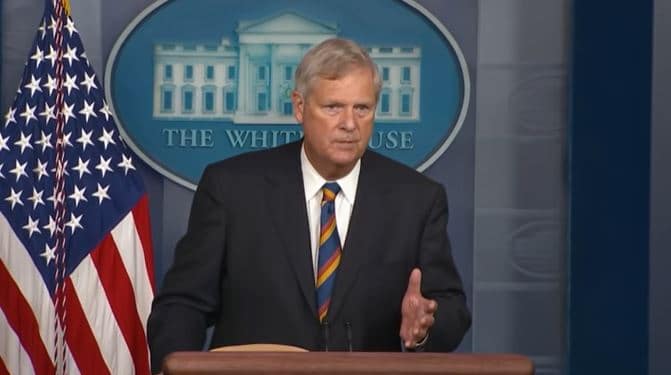The Biden Administration is taking a tougher stance towards meatpackers that is says are causing food price inflation at the retail level. On Wednesday, the White House hosted a press briefing with Press Secretary Jen Psaki, Secretary of Agriculture Tom Vilsack, and Director of the National Economic Council Brian Deese to discuss the impacts of a highly concentrated meatpacking sector for American producers and consumers.
In an accompanying article, titled Addressing Concentration in the Meat-Processing Industry to Lower Food Prices for American Families, the White House outlines how the Big Four meatpackers are generating record profits during the pandemic, at the expense of consumers, farmers, and ranchers.
Looking at the question of rising grocery prices, Deese told reporters that beef, pork and poultry amount to roughly half of the increase in food prices at grocery stores since December 2020. Since May of 2021, beef prices have increased 14%, pork prices by 12.1% and poultry by 6.6%.
Deese then said that with the increase in prices and 55-85% of the packing sector being controlled by the largest processors, “It raises a concern about pandemic profiteering, about companies that are driving price increases in a way that hurts consumers that are going to the grocery store and also isn’t benefiting the actual producers that are growing the product.”
In his comments, Secretary Vilsack noted numerous times that producers selling livestock are losing money, while consumers pay higher prices and “the fact that there are now record profits or near-record profits for those in the middle.”
Vilsack laid out the actions that the Administration is taking to address high meat prices for consumers, market transparency for producers and increase oversight of packers. Those actions include cracking down on illegal price fixing and enforcement of antitrust laws. He said the administration will utilize the Packers and Stockyards Act to make sure that USDA is “identifying and holding people accountable for unfair and discriminatory practices.”
Vilsack said there has been so much consolidation in the processing industry that “it’s very difficult to determine whether or not the prices being aid to farmers is fair.” He added that’s why USDA is producing studies on price discovery, and alluded to the need for legislation that should be passed. “Certainly we want to work with Congress in their efforts legislatively to pass legislation that will expand the capacity for us to have information.”
The secretary added that USDA also wants to see changes to “product of the U.S.” labels for meat to ensure consumers actually understand what it means.
Finally, the Secretary spoke about USDA’s efforts to provide relief to small processors and workers hurt by COVID-19 and strive to create a more competitive food supply chain. USDA will invest $700 million to reach small operations who have not received previous rounds of federal pandemic aid. USDA will also provide $700 million to states, tribes, and nonprofit organizations to distribute up to $600 per worker in relief payments directly to frontline farmworkers and meatpacking workers who incurred expenses in responding to the pandemic. USDA will also invest $500 million to support new competitive entrants to expand local and regional meat and poultry processing capacity.
United States Cattlemen’s Association (USCA) President Brooke Miller issued the following statement regarding the announcement:
“To see the need for increased competition in the U.S. cattle marketplace rise to the White House level is a testament to the many, many agricultural producer and consumer voices who have been advocating for change. COVID-19 highlighted what we already knew to be true – that a lack of transparency and true price discovery hurts independent producers and processors, and inflates prices for beef at the retail counter.
“USCA commends the Biden-Harris Administration on this important first step towards addressing concentration in the meatpacking sector. We look forward to working with USDA leadership, including the newest advisor for Fair and Competitive Markets, to investigate illegal and anticompetitive practices in the cattle marketplace.”
The North American Meat Institute’s Chief Operating Officer, Mark Dopp, responded to the comments from the Biden Administration saying, “As with almost every industry, meat and poultry packers and processors of all sizes have been, and continue to be, affected by the global pandemic and the inflationary trends that challenge the U.S. economy. American consumers of most goods and services are seeing higher costs, largely due to a persistent and widespread labor shortage. The meat and poultry industry is no different. Issuing inflammatory statements that ignore the fundamentals of how supply and demand affects markets accomplishes nothing. Meat and poultry markets are competitive and dynamic with no one sector of the industry consistently dominating the market at the expense of another.”
###
USCA/DTN/USDA/NAMI


